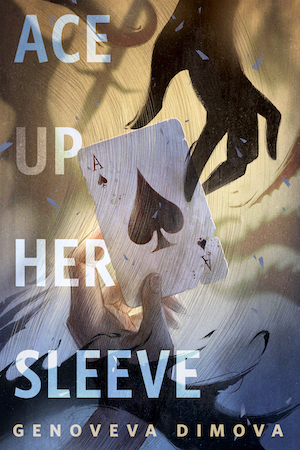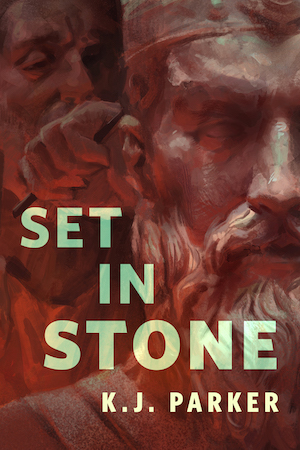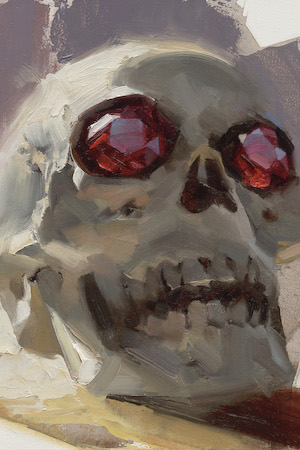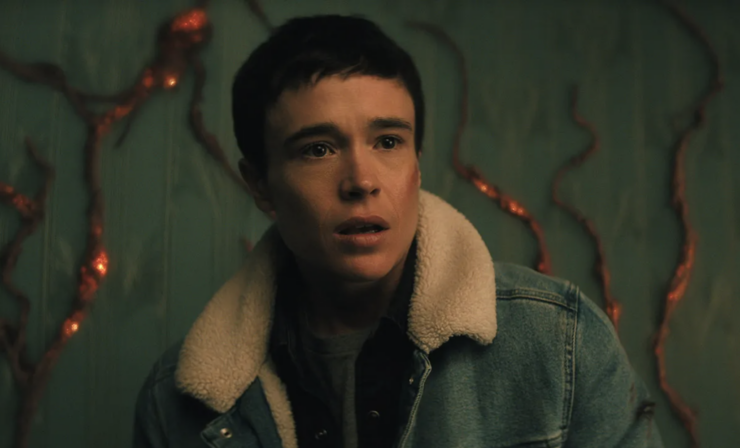One of the hallmarks of The Umbrella Academy—both the comic book by Gerard Way & Gabriel Bá and the Netflix TV show whose fourth and final season just aired—is that it’s a deconstruction of superhero stories and an examination of family. This final season of the Netflix show—which is the only one of the four that isn’t at least loosely based on one of Way & Bá’s comics miniseries—takes that to its extreme, and also comes with a bit of satire on the recent trend toward embracing a multiverse.
What’s not entirely clear is whether it’s a success or not.
The season is abbreviated, only six episodes as opposed to the ten the three prior seasons had. That, at least, is a benefit, as each previous season had a lot of meandering and filler. More impressively, this season also manages to balance the cast nicely. All three prior seasons suffered from cast bloat, occasionally losing track of some characters or writing them out of the storyline for lack of anything for them to do. (This was at its worst in season three, when they added an entire new team of Sparrow Academy kids, and the story had to move quickly to get rid of a bunch of them so the story had room to breathe.)
That doesn’t happen in season four, despite having pretty much the same main cast back. We’ve got all of the Hargreeves children who were inexplicably born on the same day to women who weren’t pregnant when the day started and who all had super-powers. We left them at the end of season three having changed the timeline for the umpteenth time and winding up back in 2019 without their powers.
They jump the timeline forward a few years, which is a relief, as the actors have all aged, and this is the first time the characters have been permitted to do so as well. (Particularly an issue for Aidan Gallagher as Five, who is finally allowed to be as old as the now-twenty-one-year-old actor is.) In the five years following their return, Viktor (Elliot Page) has opened a bar in Canada and appears to be happy and content. Allison (Emmy Raver-Lampman) has been a working actor, mostly in commercials, while taking care of her daughter. In the latter, she has been aided by Klaus (Robert Sheehan), who has been clean and sober—and also become a paranoid germophobe. Now that he’s no longer able to recover from being killed, he’s scared of pretty much everything. Diego and Lila (David Castañeda and Ritu Arya) are now married with children and living a suburban life, the former as a delivery truck driver, the latter as a housewife. Ben (Justin H. Min) ran a Ponzi scheme involving cryptocurrency and spends most of the time between seasons in jail. Five is an agent for the CIA (though the work he’s doing is more the type of thing done by the FBI). And poor Luther is squatting in the condemned building that used to house both the Umbrella Academy and the Sparrow Academy and working as a male stripper.
Of course, circumstances contrive to give them all their powers back, though many of them have altered powers.
The reason for them having powers again is that they’re needed to save a young woman named Jennifer, who has apparently been kidnapped, at least according to a man claiming to be her father (David Cross).
However, Jennifer is being protected by Hargreeves Enterprises employees. Sir Reginald Hargreeves (Colm Feore) is an industrialist in this timeline, having abandoned the notion of raising a team of superheroic children.
It turns out that Jennifer—who was found inside a giant squid decades ago (which is hilariously shown in a flashback news story)—is a harbinger of The Cleanse. The entire half-dozen-episode season is about The Cleanse. There’s a cult known as the Keepers, led by Gene and Jean Thibedeau (brilliantly played by real-life husband-and-wife Nick Offerman and Megan Mullally) who are trying to bring about The Cleanse faster.
And the reason for all this is that there have been too many time-travel shenanigans. Time travel has been a theme of all four seasons of Umbrella, and history keeps being altered and changed and destroyed and reset. The Keepers are all people who can sense that the timeline is wrong and needs fixing.
We’ve been seeing this in a lot of superhero screen fiction lately. The Marvel Cinematic Universe first pitched many-worlds theory in Avengers: Endgame, and it’s been a significant theme in the Loki TV series and the recent movies featuring Spider-Man, Doctor Strange, Ant-Man & the Wasp, and Captain Marvel. DC made it a big part of their “Arrowverse” TV shows, as well as the recent movie starring the Flash. And, of course, we’ve seen it in the comics a lot, going back to DC using “Earth-2” to explain why there was a Justice Society during World War II featuring Superman, Batman, and Wonder Woman, but also a Justice League in the 1960s featuring the same trio.
And The Umbrella Academy’s answer to it is to burn it all down. It’s established that Five has tried several times to restore the timeline, including—as previously established—founding the very Time Commission that he worked for as a time-displaced mercenary. In this season, we see that several alternate versions of Five have settled in a diner because they’ve given up trying to fix things. And they try to convince our Five to do so, but instead he realizes that there’s a solution: let The Cleanse win.
Getting there has the usual Umbrella Academy tropes of the family fucking up, of Luther trying to be earnest and heroic, of Diego trying to be a badass and mostly (but not entirely) failing, of Klaus getting into all kinds of trouble because he makes bad choices, and of Five being the only grown-up. In addition, this season in particular we have Allison avoiding the rest of the family because of her awful behavior last season, Ben (who is the Ben who was with the Sparrow Academy, not the Ben they all knew, who was killed as a kid) not giving a shit about anybody but himself until he finds his soulmate, and Viktor trying to be a better sibling and save people.
What’s interesting here is that Viktor is the only member of the family who’s trying to be a hero. Which is especially fascinating given that Viktor was, in essence, the villain of season one. But throughout, Viktor is focused on trying to save people rather than harm them, which puts him one up on his siblings, all of whom rack up quite the impressive body count. Page does an excellent job with Viktor’s passion to do the right thing, an urge that is sadly unique in this particular group of people…
Five also gets something he hasn’t had at any point in the show’s run: happiness. It’s short-lived, of course, because nobody on this show is allowed to be happy for long. But there’s a period where he and Lila are trapped in various alternate timelines. Five’s powers, when they’re restored, change to enabling him to jump to a subway that goes between alternate timelines. It takes him and Lila almost seven years to find their way back home, and they take refuge in each other’s arms quite a bit, with Five falling in love. Lila, however, is kept (relatively) sane by thinking of Diego and her kids and getting back to them. So when they finally return, Five’s heart is broken.
I can’t sing enough praises of the work Gallagher has done in this series, and he kicks it up a notch here. Already he has consistently presented Five as almost effortlessly competent, by far the smartest and most capable person in the ensemble. Here, he gets an emotional through-line to go with his usual plot-heavy one, and Gallagher plays it magnificently.
So does Arya, whose Lila gets a lot more depth this season as well. She’s not just the crazy person she’s been in previous seasons, she’s a wife, a mother, and a talented operative. But she’s also found a family, people to love and cherish, which gives her life a purpose she hadn’t expected—and which she doesn’t really appreciate until she’s taken away from it for more than a dozen years.
Mention should be made of Sheehan’s Klaus, whom I didn’t take to initially, but who is brilliant in this final season, beautifully playing the de-powered Klaus’ paranoia and the powered Klaus’ spectacular ability to fuck up his life. As usual, he winds up running a scheme, though this one works because he genuinely is a medium who can talk to the dead…
Other highlights include a very well-done flashback to when the Umbrella Academy were kids, as we see the mission where Ben died, a sequence that reminds us just how much of an asshole Sir Reginald is; pretty much every scene with Offerman and Mullally, who are comedy gold; and Diego’s constant frustrations with everything, which is extremely well-played by Castañeda.
The season works really well until the end, and that’s where I have a hard time getting my arms around it.
As has happened every season, Five is the one who either presents the problem to the team or who comes up with the solution, or both. In this case, it’s the second option, as he realizes that they need to let The Cleanse win and destroy everything. More to the point, the six of them need to be removed from the timeline completely, as their existence is what messed everything up.
So after four seasons, our heroes finally fix everything by doing absolutely nothing.
On the one hand, it’s incredibly on-brand. The Hargreeves siblings are, bluntly, shit at being superheroes. Always have been. So it is incredibly appropriate that the best thing they can do for the space-time continuum is to do absolutely nothing.
But it’s also incredibly unsatisfying as the conclusion of a TV show.
I mean, seriously, they just stand there and let a bunch of goo cover them all? On the one hand, they do sacrifice themselves to save the universe. On the other hand, they do so by just standing there and it’s so incredibly anticlimactic.
A truly happy ending was never in the cards for the Hargreeves kids, and to provide one would’ve felt false. So maybe this was the only way to make it work: a happy ending for the universe, at least, as they are finally able to get it right and save everyone, but done in a truly half-assed and fucked-up manner.
So maybe it is the right ending…










